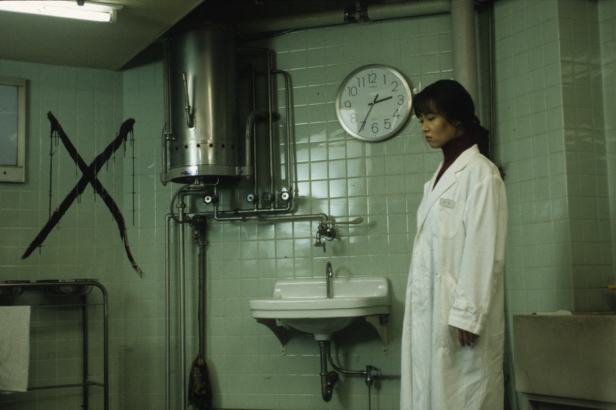Genre fans will tell you that it’s hard to pin Kiyoshi Kurosawa down. He’s made some truly terrifying chillers, including the original Pulse (Kairo), and he’s made affecting arthouse fare like Journey To The Shore and Tokyo Sonata. 1997’s Cure is much closer to the former, a faintly meandering but totally compelling and deeply scary blend of police thriller and horror that’s available on home video in the UK for the first time thanks to Eureka Entertainment.
Kôji Yakusho (13 Assassins) plays detective Keniche Takabe, tasked with investigating a string of grisly murders. None of the perpetrators have violent histories but they felt compelled to commit this one terrible act. As Takabe desperately hunts for some kind of connection between these crimes, we meet Kunio Mamiya (Masato Hagiwara), an amnesiac who drifts into people’s lives at random and somehow gives them the nudge they need to kill.
While it has the structure of a cop movie, flipping between Takabe’s investigation and Mamiya’s eerie encounters, Kurosawa establishes a rhythm entirely of his own. Every piece of information that gets our hero closer to his target is simply…information. We start to understand how Mamiya is committing these crimes but each answer leads to another question, and the “why” of it all is teasingly nudged further and further away.
It’s a grim labyrinth where the next murder is an inevitability, and Kurosawa compounds this sense of mundane, ever-present evil by avoiding overtly Gothic imagery or mood for the bulk of the film. The recurring ‘X’ on the wall is a simple but dread-inducing signifier and sudden moments of gore are all the more shocking for their rarity.
As with Pulse, there’s an underlying sense of urban disconnection here as Takabe struggles to balance his commitment to his job with caring for his wife, who’s struggling with mental health issues. Acts of violence are committed suddenly and randomly with no real sense of remorse. Mamiya is an empty vessel who locates repressed resentment, finding the nasty little voice in your head and amplifying it to monstrous levels. There’s no escape from something that’s always there and the film’s morbid, doom-laden atmosphere will envelop you.
